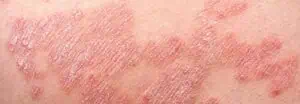HOW DID BEING IN LOCKDOWN AFFECT OUR SKIN?
During the COIVD-19 pandemic, we all experienced periods of lockdown where normal daily activities were put on pause and our routines changed. We have spoken to two of our Consultant Dermatologists about how lockdown has affected our skin and the reasons for this.
WHY MIGHT PEOPLE BE EXPERIENCING MORE BREAKOUTS?
We have spoken to Dr Mark Hudson-Peacock about why people might be experiencing more breakouts during periods of lockdown.
“For those with pre-existing skin conditions such as eczema, psoriasis or rosacea, being in lockdown could exacerbate these. However, in the absence of any pre-existing condition, there are many other factors involved in why people could be experiencing more skin breakouts right now. Some possible reasons could be stress, a change in diet, a lack of vitamin D and a change in your normal skincare routines.
Staying indoors will reduce exposure to ultraviolet light and will reduce sun damage, albeit this will be minimal compared to a lifetime of exposure prior to the Covid lockdown! It will reduce vitamin D activation in the skin but this can easily be overcome with Vit D supplements of appropriate type (if not sure, get your GPs advice first).
Often called the ‘sunshine vitamin’, vitamin D plays an integral role in skin protection and rejuvenation. It is activated in the skin by Ultraviolet B light and, in its activated form as calcitriol, vitamin D is involved with skin cell growth, repair, and metabolism. It also enhances the skin’s immune system and helps to destroy those free radicals that can lead to premature sun ageing.
Probably the main issue of staying indoors is the effect on mental well-being which cannot be underestimated. Getting outside for some light exposure is good for skin health, general health and mental health. Just 15 to 30 minutes of daily sun exposure can be helpful in addressing all of these issues, so go for a walk or a run (remember stay at least 2m (6ft) away from others), sit on your balcony or on your patio or open your window and breath in the air and get some light on your skin. Relax and enjoy those minutes to de-stress if you can. Stress can certainly upset all of the above, so look to find ways that help you de-stress: read a book, go for a run, yoga etc, you know what relaxes you most, so do it.
For those worrying about dull skin or how often to cleanse, during these times, I would say don’t worry: who’s going to be seeing you, so who cares! Just stick to your normal routines if you want to and make the most of giving your skin a chance to breathe. If you must, consider the 3 staples for your skin: an antioxidant, an SPF for longer periods outside and topical retinoids at night. A 4th is to moisturise if you need to. If you are inside and the heating is on, consider a moisturiser to combat dry skin.”
SHOULD ANY CHANGES BE MADE TO SKINCARE ROUTINES WHILE ON LOCKDOWN?
Hear from Dr Mark Hudson-Peacock on changes to skincare routines during periods of lockdown.
“For those with an existing skin condition or who are noticing some outbreaks, the best skincare routine would be based on avoidance of irritants and replenishment of moisturisers. The most common irritants are soaps and ‘cleaning’ compounds, such as ethanol. Your average skincare regime from a dermatology perspective is wash your face twice a day using soap substitutes (to avoid any irritation) and then moisturise rigorously.
Make sure if your skin is starting to feel dry and itchy swap your usual soap or shower gel for a mild soap substitute and fragrance-free, hypoallergenic products. Gentle face washing with an emollient such as aqueous cream is a good start to a skincare regime. If there is oiliness or acne a gentle cleanser can be applied. Treat acne pimples with topical creams (usually prescribed by the GP or dermatologist) and moisturise with a light moisturiser. If your acne is resulting in acne scarring, you will likely need to wait for a professional dermatologist to recommend an acne scarring treatment plan. I’d also usually recommend a high factor SPF but in a lockdown scenario that might not be as relevant but for those going out for a walk when sunny always best to use protection.
The products that I (and most dermatologists) recommend are simple fragrance-free moisturisers. There are two types – a) creams such as Doublebase, Cetraben, Diprobase and b) ointments such as Vaseline, Hydromol, Epaderm”
OUR TOP TIPS FOR HEALTHY SKIN
CATCH UP ON SLEEP
If at all possible get plenty of sleep and de-stress. It is a known fact that stress and exhaustion lower the immune system and make most skin conditions worse or cause a flare up. The more one looks after oneself, the better the immune system and the less of a problem many of these things will be.
For those suffering with skin conditions such as eczema, it’s important to know that eczema is rarely ‘caused’ by stress but can be exacerbated by it. Reducing levels of anxiety or stress is unlikely to make your eczema go away completely but it might be able to ease the symptoms. For people feeling anxious it can often be harder to ignore the itching and discomfort of eczema which can lead to more scratching and irritation and a vicious cycle can begin. So perhaps try and include in your day ways to make you feel less anxious.
Stress can also make it harder to sleep and a loss of sleep can influence your skin’s ability to heal. So, getting plenty of sleep is certainly going to help but sometimes a change in personal circumstances, which everyone is going throught right now, can trigger feelings of stress and a flare-up is unavoidable.
“At night the skin relaxes. It’s not under any stress so can recuperate after a hard day. Your skin cells go into regeneration mode, replacing damaged or dead cells with new ones. When sleep is reduced, so is the body’s ability to carry out these functions.
The skin itself doesn’t suffer too much due to lack of sleep, but the muscles around the face tend to be quite tired and can give the skin around the eyes a puffy, sallow appearance. Lack of sleep might also reduce the amount of Melanocortin going around the body and this can make the skin paler. A bare minimum of six-seven hours but ideally nearer to 8 hours would suit.
EAT WELL
People might not be eating well right now. Whether this is due to not be able to get out and shop like normal or just their change in daily routine, it can all affect ones eating habits. However, it’s important to eat a healthy and balanced diet to maintain all one’s minerals and natural oils. Eating lots of vegetables and salads these will soak up the free radicals and help the look and feel of the skin.
STAY INSIDE
Our environment can affect our skin in many ways. The drier the air the drier our skin becomes and conditions such as eczema and psoriasis can worsen. The skin will start to lack moisture and need hydrating. Colder months of the year (and a lockdown!) also means less sun exposure and people cranking up the central heating so our skin can lose vital vitamin D making the skin appear dull and sallow. Central heating can dry the skin out so regular moistruising is especially advisable.
DON’T SKIP THE MOISTURISER
Everyone should moisturise at least once a day to keep skin protected and hydrated. It is especially important if you have dry skin or a condition like eczema but using a non-comedogenic moisturiser is still important if you have greasy or spot-prone skin. Generally speaking, dermatologists like patients to keep their skin moisturised all the time as it keeps the skin in good condition and prevents eczema and dermatitis. Oil based products tend to stay on the skin better and will spread easily over oily skin.
ALWAYS REMOVE YOUR MAKEUP
Remove your make up every night. If you haven’t removed your make-up for a day or two you tend to be heavier handed to try and remove stubborn make-up that’s been on the face a while. This firm wiping action required can irritate the skin and encourage flare ups. The very act of rubbing will usually cause blood vessels to dilate causing redness. Irritant eczema and irritation will come up red also. This will also often feel itchy or stinging. The under-eye area especially is very delicate, so you want to avoid harsh rubbing of this area. When removing mascara and eye make-up it’s best to gently place a cotton ball with remover over your lid and hold it there for a few seconds to help dissolve the product before wiping it away. Once removing your make-up it’s always good practice to wash the face after use a foaming face wash with salicylic acid and then a fragrance free moisturiser. This will help those that are prone to acne and prevent the skin drying out.
AVOID ALCOHOL
Excess alcohol consumption can cause blood vessel dilatation which can make the face look quite red. This is because alcohol dilates the blood vessels and increases the cardiac output so that everything gets redder. Anyone who already has skin disease such as dermatitis or psoriasis etc., will often notice it worsening. Acne rosacea is the most famous of the conditions that worsens with alcohol. The combination of repeated alcohol intake, and vascular dilatation, can cause chronic redness.
If you are concerned about your skin, please get in contact with us. We are able to offer face to face appointments in one of our clinics or video consultations.


